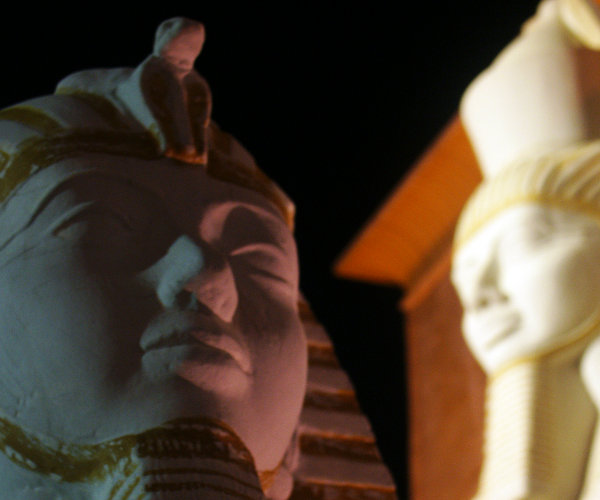
This is post #43 in our series on Tafseer of Juz ‘Amma (click the link to see all posts in this series).
Continuing into our foray of tafseer of Surah An-Nazi’aat, we reach the story of Musa (alayhi salaam). Allah (‘azza wa jal) says:
هَلْ أَتَاكَ حَدِيثُ مُوسَىٰ
Translation: Has there reached you the story of Moses? [Surah Naazi’aat, verse 15]
One of the interesting aspects of Qur’an you don’t get from the translation is discourse. (A discourse is a single discussion on a single topic.) In the Qur’an, Allah (‘azza wa jal) used rhyming to distinguish different discourses. This means that when the rhyming changes (look at the form of the last word), you can tell that the topic, too, is changing.
And here we see that — the word changes from “as-saahirah” to “Musaa,” with alif-maqsuwr. The next eleven verses keep with this type of rhyming, until the end of the story of Musaa (alayhi salaam).
Allah (subhannahu wa ta’ala) says:
هَلْ أَتَاكَ حَدِيثُ مُوسَىٰ
إِذْ نَادَاهُ رَبُّهُ بِالْوَادِ الْمُقَدَّسِ طُوًى
اذْهَبْ إِلَىٰ فِرْعَوْنَ إِنَّهُ طَغَىٰ
Translation: Has there reached you the story of Moses? – When his Lord called to him in the sacred valley of Tuwa, “go to Fir’awn (Pharaoh). Indeed, he has transgressed. [Surah An-Nazi’at, verses 15-17]
Allah (‘azza wa jal) uses the word “hadith” to describe the story of Musa. In Arabic, one of the meanings of hadith is a tale that is so old that it has become forgotten, and now seems new again. Because the story of Musa (alayhi salaam) is an old story, one from the time of Bani Isra’eel at least.
Another interesting point is that, from hadith, we hear that when Musa (alayhi salaam) was called to Tuwa, he came running full-speed to get there. He did not delay or come at his leisure. You can also see this in the qualities of Abu Bakr (radiallahu ‘anhu), that he would hasten to good deeds. This is a quality we should all engender in our lives. As one scholar said, “Live for dunya like you’re going to live forever (i.e. put things off because there’s always tomorrow), and live for akhirah like you’re going to die tomorrow.”
Notice also the reason that Allah sent Musa to Fir’aun — because he transgressed. Taghaa (طَغَىٰ) means going beyond the boundaries and limits, like water overflowing from a cup.
And then:
فَقُلْ هَل لَّكَ إِلَىٰ أَن تَزَكَّىٰ
وَأَهْدِيَكَ إِلَىٰ رَبِّكَ فَتَخْشَىٰ
Translation: And say to him, ‘Would you [be willing to] purify yourself, and let me guide you to your Lord so you would fear [Him]?’” [Surah An-Nazi’aat, verses 18-19]
The wording here of Musa is very eloquent and polite. You can translate it as would you care to purify yourself? A very nice, pleasant, respectful addressing.
To Fir’awn. The one who claimed godhood. The one who slaughtered legions of children from Bani Isra’eel.
Surely this is what Allah (‘azza wa jal) meant when He said:
ادْعُ إِلَىٰ سَبِيلِ رَبِّكَ بِالْحِكْمَةِ وَالْمَوْعِظَةِ الْحَسَنَةِ ۖ وَجَادِلْهُم بِالَّتِي هِيَ أَحْسَنُ ۚ
Translation: Invite to the way of your Lord with wisdom and good instruction, and argue with them in a way that is best. [Surah An-Nahl, verse 125]
Many are those of us Muslims who start becoming practicing (or become Muslim) and don’t apply this ayah! Musa (alayhi salaam) could’ve called Fir’awn a mass-murderer, a child-killer, and worse; but he didn’t. Instead, he asked very politely:
Would you care to purify yourself?
The story continues:
فَأَرَاهُ الْآيَةَ الْكُبْرَىٰ
فَكَذَّبَ وَعَصَىٰ
ثُمَّ أَدْبَرَ يَسْعَىٰ
فَحَشَرَ فَنَادَىٰ
فَقَالَ أَنَا رَبُّكُمُ الْأَعْلَىٰ
Translation: And he showed him the greatest sign, but Pharaoh denied and disobeyed. Then he turned his back, striving. And he gathered [his people] and called out, and said, “I am your most exalted lord.” [Surah An-Nazi’aat, verses 20-24]
“Kathhaba” (كَذَّبَ) with shadda on the thal is a more intense version of kathaba (كَذَبَ — no shadda). Kathaba means to lie, and to deny the truth.
Note in Fir’awn’s claim, he said that he is Al-A’laa (الْأَعْلَىٰ). Aside from being one of Allah’s names, Al-A’laa is in the form of the superlative (the highest degree) of a description; it means “the highest” (literally), from the same root as the names ‘Ali (the masculine form) and ‘Aaliya (the feminine form).
Shaykh Noman (from Bayyinah) mentions that this is not the first time Fir’awn made this claim; indeed, in other surahs, we see that in other places in the story he claimed similar things.
You can’t just make a claim like that and get away with it. Allah says:
فَأَخَذَهُ اللَّهُ نَكَالَ الْآخِرَةِ وَالْأُولَىٰ
إِنَّ فِي ذَٰلِكَ لَعِبْرَةً لِّمَن يَخْشَىٰ
Translation: So Allah seized him in exemplary punishment for the last and the first [transgression]. Indeed in that is a warning for whoever would fear [Allah]. [Verses 25-26]
Notice that khashiya (simply translated as “fear”) is mentioned here again. What did Musa (alayhi salam) call Firawn to? To having khashiyah of Allah — “And let me guide you to your Lord so you would fear [Him]?’” (verse 19).
Truly, this is the fruit of eman in Allah: that you have fear (and hope) in Allah, and that you do (more) good deeds and stay away from sins and evil deeds.
Here, the rhyme scheme changes (new discourse). And so here, we will stop, until next week insha’Allah where we conclude this great surah. May Allah (‘azza wa jal) give us the tawfique to learn from these great lessons and implement them in our lives, ameen!
References:
- Touched by an Angel: Tafseer of Juz ‘Amma. By Muhammad Alshareef. 2009.